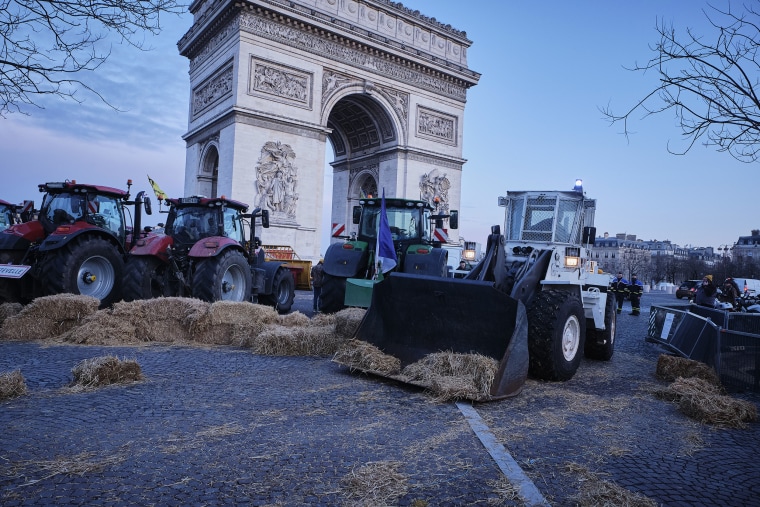Farmers protests pressure India, Europe over crop prices, Ukraine war and
For weeks, Karan Singh camped in a makeshift tent some 180 miles from India’s capital, New Delhi.
Singh and five other farmers from his village in the western state of Punjab have been living on their own supplies, including a gas cylinder and raw produce they packed from their farms when they drove down in a tractor to join thousands more in a mounting campaign to pressure the government to raise crop prices.
“I am drowning in debt,” said Singh, who mainly farms wheat and rice on his 10-acre plot of land. “We are utilizing our farms as much as we can. There’s no lack of production, but we are not able to get any fair price for it.”
Tractors have been rolling down highways not just in India but across Europe — where issues including the impact of Russia’s war in Ukraine, climate change and efforts to fight it as well as rising competition have driven angry farmers to the streets of Paris, Brussels and beyond.

While the specific factors fueling the anger vary from country to country, the result is largely the same: Farmers say governments need to take drastic action if their way of life is to survive. And the timing is no coincidence, experts say, with protesters seeking favorable policies in a year with a record number of elections around the globe.
“Most farmers are not making a profit. Most of them are scraping by and doing backbreaking work most city people don’t understand,” said Chris Hegadorn, a former U.S. diplomat and an adjunct professor of food politics at Sciences Po in Paris.
“Election cycles allow them to press their case publicly,” Hegadorn said.
Singh and thousands of farmers in northern India began marching to the capital earlier this year demanding higher prices for their crops, among other debt relief measures. They were met with tear gas, rubber bullets, internet blackouts and police batons and blocked from the capital for weeks until last Thursday when they were allowed to rally there.
Prime Minister Narendra Modi and his ruling Bharatiya Janata Party (BJP) are seeking to avoid a clash with the farmers ahead of elections later this year.
“I think Modi and the BJP government are frightened by the power of farmers,” said Garrett Graddy-Lovelace, an associate professor at American University in Washington, D.C.
“They are a formidable political force,” she added.
Farmers say they are not asking for subsidies but a fair price that would see them receive a 50% profit over their cost of production.
“The urgency of staying on the land depends upon a fair price,” Graddy-Lovelace said, “so they can stay on their land and keep nourishing the people.”
Almost two-thirds of India’s 1.4 billion population are farmers.
For decades they relied on a minimum support price for their crops, which is a rate at which the government guarantees to buy surplus stock at the end of the harvest. State governments have historically bought only rice and wheat at the fixed level.
But in 2020, the government opened up the markets to corporate buyers, who work directly with the farmers.
“It looked good on paper,” Graddy-Lovelace said. But “the farmers knew that if they were dealing directly with the buyer, the buyers would drive the price down to nothing.”
Months of protests and deadly clashes with authorities in New Delhi ultimately forced the government to repeal the new farm laws, in what was seen as one of Modi’s biggest political defeats since he took office in 2014.
It was an “extraordinary victory,” Graddy-Lovelace said, “not just for India, but actually pushes back against a whole kind of global paradigm that free trade works for farmers.”
But the farmers say that the government has not kept promises made in the wake of that clash, leading Singh and others to travel far from home in a bid to secure reforms.
‘Farmers’ concerns are real’
It’s not just India where farmers are struggling.
Across the European Union, farmers say they are battling soaring costs of living and production, rising taxes and the burden of new environmental rules, which they say renders them uncompetitive against cheaper imports from abroad.
Hegadorn said that in recent years governments have made a “huge number of political commitments … to reduce greenhouse gases.”
Over the last few months, protests have united farmers across the Continent. In France, Germany, Belgium, the Netherlands, Poland, Spain, Italy and Greece, farmers have blared horns and in some cases dumped manure at government buildings in a bid to put their plea for reforms at the forefront of the E.U. parliamentary elections to be held in June.

Read More: Farmers protests pressure India, Europe over crop prices, Ukraine war and

